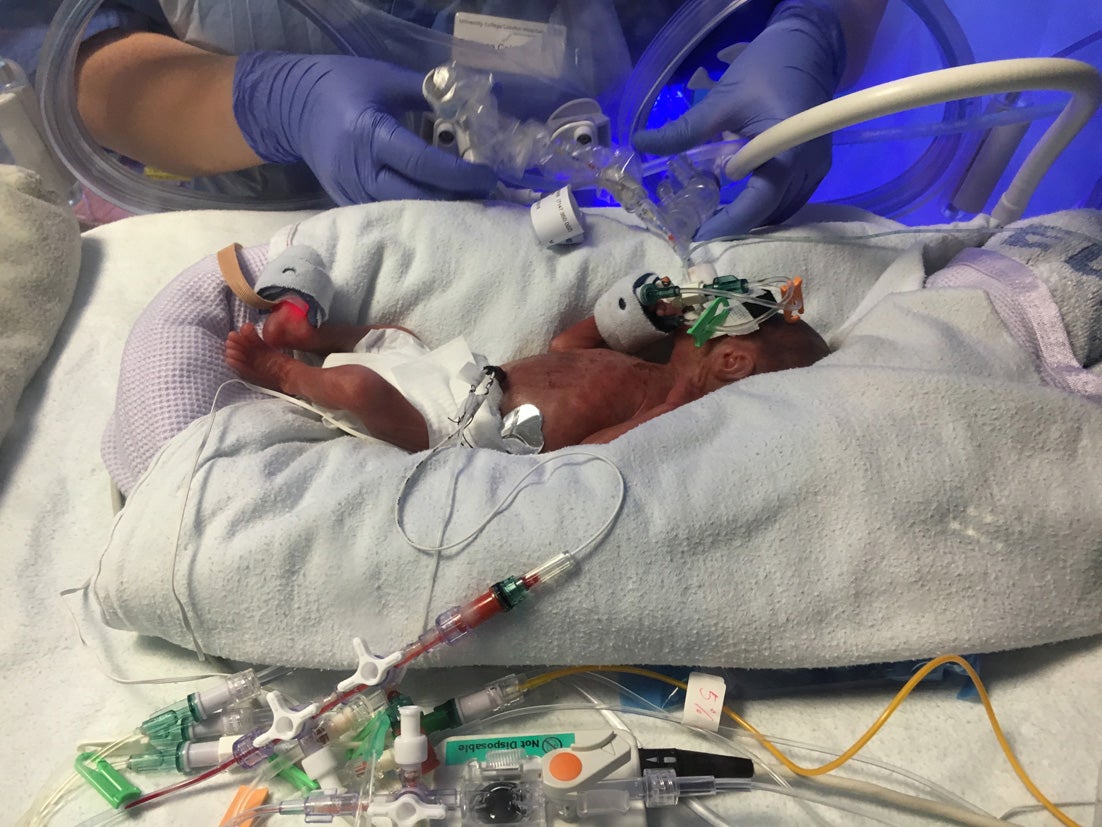Baby born a week before legal abortion limit survives against odds
Flynn Parry was born when his mother was just 23 weeks pregnant

Your support helps us to tell the story
From reproductive rights to climate change to Big Tech, The Independent is on the ground when the story is developing. Whether it's investigating the financials of Elon Musk's pro-Trump PAC or producing our latest documentary, 'The A Word', which shines a light on the American women fighting for reproductive rights, we know how important it is to parse out the facts from the messaging.
At such a critical moment in US history, we need reporters on the ground. Your donation allows us to keep sending journalists to speak to both sides of the story.
The Independent is trusted by Americans across the entire political spectrum. And unlike many other quality news outlets, we choose not to lock Americans out of our reporting and analysis with paywalls. We believe quality journalism should be available to everyone, paid for by those who can afford it.
Your support makes all the difference.A woman whose miracle baby was born 17 weeks early – a week before the legal abortion limit of 24 weeks – has revealed how her son is one of Britain’s youngest ever premature babies to survive.
Flynn Parry, now 15 months old, weighed just 1lb 1oz – less than a pint of milk – when his mum, Hoda Ali, 36, was just 23 weeks pregnant.
Photographs of him in hospital show he was barely as big as his mother’s hand. He was just 11 inches long, much smaller than the average newborn baby which measures 20 inches.
After he was born he was swaddled in bubble wrap, and faced a desperate battle to survive.
Ms Ali recalled: “A doctor told me, ‘He’s a fighter – all premature babies are.
“It was true. He fought every day.
“I didn’t connect to him for about 10 days after he arrived, though. He was just so, so small.
“I thought he looked like an alien or a baby bird.”
Ms Ali and her partner Owen Parry, 25, of Willesden Green, north London, were told at birth their son was unlikely to survive.
“Doctors said only one in six babies survived the night at his age,” Hoda explained. “Even the one that lived only had a 50 per cent chance of surviving any further.”
Defying all odds, Flynn not only lived, he flourished – becoming a lively toddler, who now runs rings around his parents.
He loves trains, pizza and climbing and has not experienced any developmental delays.
The only after effect of his premature birth has been some damage to his eyes, because of the time he spent on a ventilator as a newborn, which might mean him needing glasses in future.
“It’s amazing to see him now,” Ms Ali said. “He’s come so, so far.”
Ms Ali was preparing for a role in an amateur production of the play Dangerous Corner, by JD Priestly, when her waters broke at 22 weeks.
Days earlier she’d returned home from a trip to the Philippines with Mr Parry and received the all clear at her 20 week scan at University of Central London Hospital (UCLH) – discovering she was having a boy.
“I was driving to rehearsals when I realised I’d forgotten my costume,” she said. “So, I returned home, but arriving at the door, something happened.
“I thought I’d wet myself, but it wasn’t that.
“My mum, Soodi, 60, said it was my waters breaking and called 999.”
Taken by ambulance to UCLH, she was fed steroids to strengthen her cervix and given magnesium sulphate, in a bid to halt labour.
But, on February 13, 2016, after a 30-minute labour, the little boy she and Owen had been so excited about arrived.
Ms Ali, who is still not sure what caused Flynn’s premature birth, recalled how he was battling sepsis – a potentially deadly form of blood poisoning – and had two brain bleeds, because of his early arrival into the world.
He also had suspected necrotizing enterocolitis – a serious disease that occurs when the intestinal tissue becomes damaged and begins to die, which is most common in premature babies.
“Luckily, Flynn didn’t have it,” she said. “But we still had plenty to worry about.”
Immediately taken to neo-natal intensive care after his birth, he was put on a ventilator.
But he developed a common premature baby illness, retinopathy of prematurity (ROP) where the retinas detach from the back of the eye.
At eight weeks, he was transferred to St Mary’s Hospital in Paddington, west London, as he began to improve.
Then, at just 13 weeks he had laser surgery on his eyes.
He also needed other gruelling operations, including one to remove a hernia at 17 weeks.
Although Ms Ali found it hard to bond with Flynn at first, gradually, she fell in love with him, especially when at a week old she finally cuddled him.
Recalling the moment, she said: “I just loved it. He was wonderful.”
Originally due on June 6, 2016, Flynn was finally allowed home from hospital on June 16 – still small, but healthy.
“Walking out of hospital, we were so proud of our boy and everything he’d battled,” his mother said. “He really is amazing.
“It’s still not clear exactly why I gave birth so early, but if I fall pregnant again I will be monitored for early labour.
“Flynn brings hope to everyone with premature babies, currently in hospital. You can get through it.”
Press Association
Join our commenting forum
Join thought-provoking conversations, follow other Independent readers and see their replies
Comments